April 2020: Olive Tree

Volume V/Issue 1/April 2020


From The Editorial Desk
Whats So "Good" About Good Friday?
Among the scandals of the cross is the fact that Christians have called it their gospel, or good news, and acknowledge it every year on Good Friday. To understand the good news of Jesus’ death we must first examine how he died. Then we can examine why he died.
In the days leading up to his death, Jesus was a young man in his early thirties. He was in good health due to his job as a carpenter and his constant walking of many miles as an itinerant minister. Jesus began speaking openly of his impending death, including at the Passover meal he ate with his friends at the Last Supper. There, he broke with fifteen centuries of protocol. In so doing, he showed that the Passover meal, which God’s people had been eating annually, found its ultimate fulfillment in him. The Passover memorialized the night in Egypt when in faith God’s people covered the doorposts of their home with blood so that death would not come to the firstborn son in their home but would rather pass them over. Jesus, the firstborn Son of God, likewise had come to die and cover us with his blood so that God’s just wrath would literally pass over us sinners as the essence of the new covenant.
During the Last Supper, Satan entered one of Jesus’ disciples, Judas, who had been stealing money from Jesus’ ministry fund for some time and had agreed to hand him over to the authorities to be crucified. After Judas left the meal to lead the soldiers to Jesus, Jesus went to the garden of Gethsemane, where he spent a sleepless night in the agony of prayer. Meanwhile, his disciples failed to intercede for him in prayer and instead kept falling asleep. At this point, Jesus was fully aware of his impending crucifixion and was so distressed that, as the Bible records, he sweat drops of blood, a physical condition that doctors report is rare because it requires an elevated level of stress that few people ever experience.
After an exhausting, sleepless night of distress, Judas arrived with the soldiers and betrayed Jesus with a kiss. Jesus was then arrested. He was forced to walk through a series of false trials where contradicting false witnesses were brought forward to offer false testimony. Despite the absence of any evidence supporting the false charges, Jesus was sentenced to be murdered. He was eventually blindfolded as a mob of cowardly men beat him mercilessly. He was then stripped in great shame, and the Bible simply says that they had him scourged.
Scourging itself was such a painful event that many people died from it without even making it to their cross.
Jesus’ hands would have been chained above his head to expose his back and legs to an executioner’s whip called a cat-o’-nine tails or a flagrum. Two men, one on each side, took turns whipping the victim. The whip was a series of long leather straps. At the end of some of the straps were heavy balls of metal intended to tenderize the body of a victim, like a chef tenderizes a steak by beating it. Some of the straps had hooks made of glass, metal, or bone that would have sunk deeply into the shoulders, back, buttocks, and legs of the victim. Once the hooks had lodged into the tenderized flesh, the executioner would rip the skin, muscle, tendons, and even bones off the victim. The victim’s skin and muscles would hang off the body like ribbons as the hooks dissected the skin to the nerve layers. The damage could go so deep that even the lungs were bruised, which made breathing difficult. Some doctors have compared the damage of flogging to the results of a shotgun blast. The victim would bleed profusely and would often go into shock, due to severe blood loss and insufficient blood flow near and through the heart.
Jesus’ bare back and shoulders, though bloodied and traumatized, were then forced to carry his roughly hewn wooden cross to his place of crucifixion. If Jesus carried the entire cross, it would have weighed a few hundred pounds, and many think it is more likely he carried just the crossbar, which would have been about one hundred pounds.
Despite his young age and good health, Jesus was so physically devastated from his sleepless night, miles of walking, severe beating, and scourging that he collapsed under the weight of the cross, unable to carry it alone. Doctors have said that the trauma from the heavy crossbar crushing his chest into the ground could have caused a bruised heart, similar to the chest trauma caused by a car accident without a seat-belt where the driver is violently thrown against the steering wheel. Understandably unable to continue carrying his cross on the roughly one-mile journey to his execution, a man named Simon of Cyrene was appointed to carry Jesus’ cross. Upon arriving at his place of crucifixion, they pulled Jesus’ beard out—an act of ultimate disrespect in ancient cultures—spat on him, and mocked him in front of his family and friends.
Jesus the carpenter, who had driven many nails into wood with his own hands, then had five- to seven-inch rough metal spikes driven into the most sensitive nerve centers on the human body, through his hands and feet. Jesus was nailed to his wooden cross. His body would have twitched involuntarily, writhing in agony.
In mockery, a sign was posted above Jesus cross that said, “Jesus of Nazareth, the King of the Jews.” At this point during a crucifixion, the victims labored to breath as their bodies went into shock. Naked and embarrassed, the victims would often use their remaining strength to seek revenge on the crowd of mockers who had gathered to jeer them. They would curse at their tormentors while urinating and spitting on them. Some victims would become so overwhelmed with pain that they would become incontinent and a pool of sweat, blood, urine, and feces would gather at the base of their cross.
Jesus’ crucifixion was a hideously grotesque scene.
Hundreds of years in advance, the prophet Isaiah saw it this way:
Despised, and the most abject of men, a man of sorrows, and acquainted with infirmity: and his look was as it were hidden and despised, whereupon we esteemed him not. (Isaiah 53:3)
Crucifixion usually kills by asphyxiation in addition to other factors—the heart is deeply stressed, the body is traumatized, the muscles are devastated, and the blood loss is severe. Doctors have thought that Jesus likely had a chest contusion and possibly a bruised heart from falling with the cross on top of him, which caused an aneurysm. Subsequently, Jesus’ heart would have been unable to pump enough blood and his lungs would have filled up with carbon monoxide. Jesus not only lived through all of this, but he even spoke lucidly and clearly with enough volume to be heard by those present. And, all he spoke were words of love and hope.
From the cross he announced forgiveness for those who crucified him, assured the criminal crucified next to him that they would be together in paradise, commended his mother to John. He cried a cry of forsakenness showing his spiritual death and separation from the Father, and expressed his agonized thirst.
At last Jesus said in a loud voice of triumph, “It is finished.” At this moment, the atonement for sin was made and the holiness, righteousness, justice, and wrath of the triune God were satisfied in the crucifixion of Jesus Christ.
Jesus then said, “Father, into your hands I commit my spirit!” Jesus reserved his final breath from the cross to shout his triumphant victory to the world by confirming that he had been restored to God the Father after atoning for human sin.
The Bible then simply records that Jesus breathed his last and died.
Jesus hung on the cross for at least six hours—from the third hour to the ninth hour, when the darkness ended. How long thereafter that he breathed his last and died is not clear in Scripture. What is more clear is the fact that if a victim remained alive on the cross for too long so that it interfered with another event like a major holiday, it was customary to break the victim’s legs, disabling him from pushing himself up on his cross to fill his lungs with air and thereby prolong his life. However, in accordance with the promise of Scripture, Jesus died quickly enough that his legs were not broken.
Furthermore, to ensure Jesus was dead, a professional executioner ran a spear through his side, which punctured his heart sac, and water and blood flowed from his side. This is further evidence that Jesus died of a heart attack; the sac around the heart filled with water until the pressure caused Jesus’ heart to stop beating. Thus, Jesus possibly died with both a literal and metaphorical broken heart.
For many years, the most sacred place on earth had been the temple, where the presence of God dwelled behind a thick curtain. Only one person each year, the high priest, was allowed to pass by that curtain and enter the presence of God on one day, the Day of Atonement. At the death of Jesus, however, the temple curtain was torn from top to bottom, signifying that God had opened his presence to the world through the cross of Jesus.
The most succinct summary of the gospel in Scripture provides insight into this theological meaning: “that Christ died for our sins in accordance with the Scriptures, that he was buried, that he was raised on the third day in accordance with the Scriptures.” In this packed section of Scripture, Paul appoints the death, burial, and resurrection of Jesus as the most important event in all of history and the verification of the truthfulness of all Scripture.
He then explains why this is good news with the simple word “for,” showing that Jesus died “for our sins.” The word “for” can mean either “for the benefit of” or “because of.” Jesus did not die “for the benefit of” our sins. He did not help them at all! Rather, he died “because of” our sins. So it was our sins but his death. We find the cross of Jesus to be the crux of good news because it was there that Jesus atoned for our sin according to the promises of Scripture.
Jesus’ work for us on the cross is called atonement (at-one-ment); Jesus our God became a man to restore a relationship between God and humanity. And that is something GOOD to think about on this Good Friday.-(MD)
Do Good Don't Just Talk About It
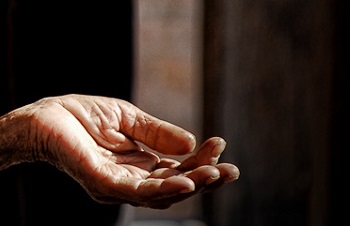
"Take heed that you do not your justice before men, to be seen by them: otherwise you shall not have a reward of your Father who is in heaven. Therefore when thou dost an almsdeed, sound not a trumpet before thee, as the hypocrites do in the synagogues and in the streets, that they may be honoured by men. Amen I say to you, they have received their reward. But when thou dost alms, let not thy left hand know what thy right hand doth." [Matthew 6:1-3]
How many of us, when we do do a good deed make sure everyone knows about it. And yet Jesus tells us to silently go about doing good. Do good, because it is God's will, not so we can get noticed. Many of us also talk about all of the things they need to do, that is anyone but our own self. The government should do this or the Church should do that. When we see good that we can do, let us go ahead and do it, seeking nothing in exchange.
In Acts (10:38): we read: "Jesus of Nazareth: how God anointed him with the Holy Ghost, and with power, who went about doing good, and healing all that were oppressed by the devil, for God was with him." Jesus went about doing good, not just talking about it. We should follow His example. Consider for thirty years Jesus lived silently, going about doing good. This should be the way we live as well, silently doing good.
Saint Paul tells the Galatians (6:9): "And in doing good, let us not fail. For in due time we shall reap, not failing." Saint Paul reminds all of us of the duty of doing good.
And just who should we do good for? We should be ready to help whoever crosses our path. Jesus tells us: "But I say to you that hear: Love your enemies, do good to them that hate you." (Luke 6:27) Yes we must do good not only to our family and friends, but also to our enemies.
The question we must ask ourselves is this, am I living a life of doing good to others? Do I take advantage of the opportunities to be a blessing in some one else's life. A kind word, opening a door to help someone get in or out of a store, etc. It is these small things where we can do much good and brighten other people's lives. Jesus advises us: "So let your light shine before men, that they may see your good works, and glorify your Father who is in heaven." (Matthew 5:16) Yes we preach far more by our actions than we ever can by our words. In fact, if we are not preaching by our actions, our words will be useless.
Saint Peter tells us: "Having your conversation good among the Gentiles: that whereas they speak against you as evildoers, they may, by the good works, which they shall behold in you, glorify God in the day of visitation." (I Peter 2:12) How is our conversation? Let us look also to our words, because they speak volumes about what is in our heart. One could say that the heart flows out of our mouth. Jesus reminds us: "But the things which proceed out of the mouth, come forth from the heart, and those things defile a man." (Matthew 15:17) Let us watch our conversation, because if it is not truly good, then we must look into our heart, which we will find is also not truly good.
In Saint Mark's (7:20) Gospel we read: "But he said that the things which come out from a man, they defile a man." And so what is flowing from our heart out into our actions. Is it good or evil? Let us examine our self carefully, for we may find that it is not just our actions, which are lacking, but our heart as well as our actions speak what is in our heart.
Our life should be one in imitation of Almighty God, a life of goodness. God does all things well and we should imitate Him in this. Goodness should be so much a part of our being that it naturally flows from us. Jesus tells us: "Wherefore by their fruits you shall know them." (Matthew 7:20) Are we bearing good fruit or evil? True Christians bear good fruit, while bad Christians bear the most putrid evil fruit.
"Jesus of Nazareth: how God anointed him with the Holy Ghost, and with power, who went about doing good, and healing all that were oppressed by the devil, for God was with him." (Acts 10:38) Notice that the point being here is that Jesus did good, not that he spoke well. Let us imitate Jesus in this. Indeed this is the answer to what would Jesus do?
I Am With You Always

"Some Thirty-Five years ago I was a member of the Guardian Angels. Now, the Guardian Angels is the anti-crime volunteer group which had its' roots in New York City and was founded by Curtis Sliwa. The Guardian Angels would patrol subways or troubled neighborhoods plagued by crime with the hopes of helping those in need, particularly in hopes of not only being an anti-crime deterrent but to actually intervene in helping victims of crime. Well, at that time I got to the point where I would travel to various cities to help in setting up local Guardian Angels chapters across the country and even in Canada. One of the cities where I helped in this capacity at the time was Seattle, Washington. Now, bear in mind that the Guardian Angels are a completely volunteer organization. As such, nobody received any type of salary. We lived off of our own money or contributions from the community. It was my time spent in Seattle where I specifically remember having an appreciation for what I had. In other words, the cause for my new-found appreciation at the time came directly from my having to "do without," so to speak. You see, when I was working full-time in my capacity as a Guardian Angel that times were lean, so to speak. Very often, we didn't know where our next meal would come from and when we did eat, it might only consist of a peanut butter sandwich. We also had powdered milk to drink. In other words, I found that I had found an appreciation of what I had previously taken for granted. It was through my "doing without" that I found a new-found appreciation of what I had in front of me and was not so picky after that. In short, I learned to appreciate the things which I did have.
The reason I am bringing this up is because there are so many in this land of ours . . . and across the world, for that matter . . . that are now finding ourselves in the position of having things taken away from us which we very well might have taken for granted previously. Going to the grocery store and seeing the shelves full of what we needed is suddenly not a given like it was just a few short weeks ago. Going out to eat at our favorite restaurant is now not available either. Deciding to go to see a movie, a sporting event, or even to travel is not available at this current time. It seems as though our world has changed so quickly. It seems as though life as we knew it such a short time ago has changed considerably. Again, things which we took for granted previously are now not available to us. Even going to work and earning a paycheck has changed for so many in our society. Think of the people who earn their paychecks as waiters or waitresses . . . . small business owners . . . . . people such as ushers or ticket-takers at major sporting events. So many of these people mentioned and so many more are suddenly without jobs and subsequently without paychecks. Again, things which were taken for granted previously. So often in the act of losing something we begin to appreciate what we do not have any longer. Even now in the midst of forced closings, I am now forced to do without something which I have enjoyed my entire life: going to church on Sunday. My entire life I have had the luxury of going to church but how often did I not truly appreciate what I had? How often did I take this simple act of going to church for granted? How often did I not not truly appreciate the wonderful gift afforded to me in going to church to worship God with my brothers and sisters, my church family? Now that I do not have this opportunity to worship God in communion and to receive the Sacraments, I am beginning to appreciate what I am now missing. As it stands now, our church will be closed for at least another six weeks. Forgive me, Lord for not truly appreciating the wonderful gift you had given me my entire life. That is: going to church, hearing the Word of God, receiving the Precious Body and Blood of Our Lord at Communion time, and enjoying the fellowship of my church family.
But all is not lost, dear friends. God is ever with us. God is with us even in the darkest hours. In St. Matthew 28:20, we hear Our Lord say: "Lo, I am with you always, even unto the end of the world." Our Lord is indeed with us always. He is with us when we read the Holy Scriptures. He speaks to us through the prophets of old. We merely need to make the effort to listen to what He is saying to us. Our Lord is present in those around us. He uses people as His instruments to speak to us, to comfort us, to support us. And in turn we also are His instruments to those around us. As I like to say, you and I have the potential to be God's face and God's hands throughout our communities, to be His ambassadors to those around us. And God speaks to us when we pray to Him. We just have to make a point to listen to what He is trying to say to us. So often this world keeps us so busy that it drowns out what God is saying to us. We are so busy with living our own lives that we don't have time for God. Now, that has changed. Or at least it has the potential to change. It is still up to us. We are the ones that still need to make the effort to listen. We still need to make a point to pay attention to what God is speaking to us. At this time when there is so much turmoil in the world around us, let us spend this time focusing on God and being with Him. Ask God to speak to you and then make a point to listen in the silence of your hearts. They may take many things away from you . . . One thing that will never leave you is the Presence of the Almighty. "I am with you always, even unto the end of the world."
The Funny Pharmacy
A joyful mind maketh age flourishing: a sorrowful spirit drieth up the bones. - Proverbs 17:22

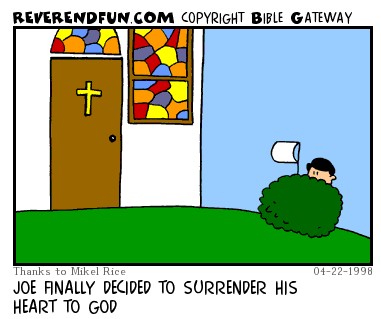





Since the purported occupants of the papal chair since Pius XII have been non-Popes, and the Council a heretical council, therefore has there been no legitimate framework for the election of a new Pope all the years subsequent to John's election?
There was not legitimate framework under the law for electing a Pope, but under the Natural Law as a Perfect Society, the Church always has the means to elect a Pope.

The Pope Speaks: April 2020
How We Learned the Truth in the Early Days of Traditionalism

Today we have many things readily available to us, that were not available a half of a century ago, when Vatican II and its perfidious spirit was set loose on us. Communication was far more difficult. Thanks be to God the copying machine became available in offices at that time. What we can find today with a few clicks of a mouse and a little typing, was buried in dusty libraries. Some of it was not even in English, although over time I have found that a lot was, including things that would have been very helpful a half of a century ago. My parents probably have spent over a thousand dollars on copies and postage between 1965 and 1975.
If anyone found something they thought was good, such as the Bull, Quo Primum, they would make copies and circulate to all of their family and friends locally and also those they knew throughout the country. We were all trying to sort out what was going on and how we should deal with this crisis. We were discussing things and looking for the answers. We knew deep down that Father Dunphy was wrong, when he said that there are no answers. There had to be an answer for
Stop and think, even the Douay-Rheims Bible was not readily available. TAN Books was founded in 1967, and republished the Douay-Rhiems and the Catechism of the Council of Trent in the early 1970's, which many of us purchased. They also published several of Father James Wathan's works. In 1971, Wathan's The Great Sacrilege criticizing the Novus Ordo was published and when we found out about it in 1973, we ordered a copy.
In about 1972, someone found a copy of the Bull, Quo Primum of Pope Pius V, when he published the Missale Romanum. The Council of Trent ordered all of the liturgical books inspected and corrections made, and the Missal was the first project completed. The Pontifical and Ritual were also revised to remove anything that had crept in that should not have been there. This was immediately copied and made the rounds. It was quite influential, as it gives priests the right to use the Missal from before Vatican II.
About the same time, prophecy came to light. In 1970, Yves Dupont published Catholic Prophecy through TAN Books. Some, reading Sacred Scripture, especially the Apocalypse, we came to the conclusion that we may be in prophetic times, possibly even the time of Antichrist. And so this book became a best seller, and still influences people today. Later on someone circulated a prophecy attributed to Padre Pio about the Three Days of Darkness. This immediately made the rounds. We wondered if the Three Days of Darkness might come upon us. In fact, some are still wondering today. (Note, we will consider prophecy in a separate piece. The purpose of this piece is to merely show the influences that effected our thinking at the time, not to comment on the legitimacy of our reflections.) Another thing circulated, a prophecy attributed to a Saint Nilus.
And then there is the famous Canon 209, which Father Francis Fenton published. Basically the Catholic Church supplies jurisdiction to priests in cases of common error. This one we misinterpreted, although Father Fenton quoted the whole Canon in his work, which also circulated. There was certainly error coming from Vatican II and it was common. However, that is not what the Canon actually means. If we had known it means an error about the possession of an office, Traditionalism might not have gone the direction it actually did. We knew that Traditionalists priests were not our pastors, but functioning in an emergency, which all believed existed.
Yves Dupont translated the diary of a priest sent into a Catholic seminary by the Communists from Russia. He entitled his typed work, The Story of Seminary Student 1025. TAN Books later released a fictionalized version under the title of AA_1025. This made the circuit rapidly. At the time we did not know that Pope Saint Pius X had warned that the enemy had already infiltrated the Church even before the Communist take over of Russia. Also the Alta Vendita story was not available to us. However, when we read this, we believed indeed that "an enemy has done this." (Matthew 13:28)
At this time also, the Fifteen Prayers of Saint Bridget circulated with the promises that were put in the Index of Prohibited Books. And many recited these prayers in order to obtain these promises. (No one at the time knew of the condemnation.)
One of the first controversies after the institution of the Novus Ordo Missae was the mistranslation of the words, "pro multis," to "for all," instead of their literal meaning found in Sacripture, "for many". Someone found the portion of the decree found in the Missale Romanum, De Defectibus on defects in the form of consecration, stating that a mutilation of essential form of consecration that changes meaning, invalidates the consecration. Two changes are made in the consecration of the wine, the mistranslation of "promultis", which is retained correct in the Latin Novus Ordo and the omission of the words "the mystery of faith." We heard of the reasoning behind the translation put forward by Joachim Jeremias, a Biblical 'scholar.' He put forth that Aramaic has no real word for "all," therefore Jesus had to use what was available, therefore He said "many," when He actually meant, "all." We did not know at the time and it was not found out until a few years ago, that two questions were answered by Modernist Rome in the early 1970's on this question, stating that what Jesus meant was "for all." It should be noted that Benedict Pope of the Conciliar Church ordered better translations of the Novus Ordo into the vernacular, which repaired this mis-translation among others. However, we must ask ourselves, in light of these two notices, what do Novus Ordo priests mean, when they say "for many."
Soon people began writing what they were thinking about what was going on in the Catholic Church. Yves Dupont wrote from Australia; Dr. Hugo Maria Kellner and Mr. William Strojie wrote in the United States. Some people in Louisville, Kentucky began writing a paper, which they called Veritas. They translated some writings from Father Joachim Saenz-Arriaga from Mexico. Writers would present what the Church teaches, citing their source, then add their comments. We were hungry for information that would help sort things out.
During the early 1970's all Traditionalists were implicit sede vacantists, because how could a Pope give us what flowed from Vatican II in our pulpits and sanctuaries? However, the position sede vacantism had not been invented. Battle lines over the Pope began to be drawn after the SSPX became entrenched throughout the world.
Several important documents did not see the light of day until far later. We have already seen the two notices about translating "pro multis" as for all." The Bull, Cum Ex Apostolatus Officio, would not be translated until the late 1980's into English. The declaration of Paul VI in 1974, Insauratio liturgica did not become readily available until a few years ago. If we had known that Paul VI intended to change the essential Rites of the Sacraments, we would known with certain to stay away from them.


Saint John Cassian
On The Eight Vices
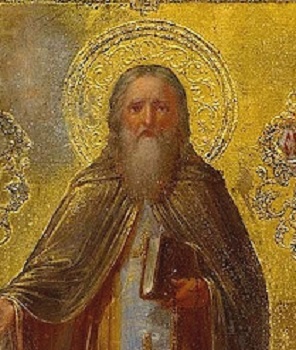
On Listlessness
Our sixth struggle is against the demon of listlessness, who works hand in hand with the demon of dejection. This is a harsh, terrible demon, always attacking the monk, falling upon him at the sixth hour (mid-day), making him slack and full of fear, inspiring him with hatred for his monastery, his fellow monks, for work of any kind, and even for the reading of Holy Scripture. He suggests to the monk that he should go elsewhere and that, if he does not, all his effort and time will be wasted. In addition to all this, tie produces in him at around the sixth hour a hunger such as he would not normally have after fasting for three days, or after a long journey or the heaviest labor. Then he makes him think that he will not be able to rid himself of this grievous sickness, except by sallying forth frequently to visit his brethren, ostensibly to help them and to tend them if they are unwell. When he cannot lead him astray in this manner, he puts him into the deepest sleep. In short, his attacks become stronger and more violent, and he cannot be beaten off except through prayer, through avoiding useless speech, through the study of the Holy Scriptures and through patience in the face of temptation. If he finds a monk unprotected by these weapons, he strikes him down with his arrows, making him a wayward and lazy wanderer, who roams idly from monastery to monastery, thinking only of where he can get something to eat and drink. The mind of someone affected by listlessness is filled with nothing but vain distraction. Finally he is ensnared in worldly things and gradually becomes so grievously caught up in them that he abandons the monastic life altogether.
The Apostle, who knows that this sickness is indeed serious, and wishes to eradicate it from our soul, indicates its main causes and says: "Now we command you, brethren, in the name of our Lord Jesus Christ, to withdraw yourselves from every brother who lives in an unruly manner and not according to the tradition which you have received from us. For you yourselves know how you ought to imitate us: for we ourselves did not behave in an unruly manner when among you, nor did we eat any man's bread as a free gift; but we toiled strenuously night and day so that we might not be a burden to any of you: not because we do not have the right, but so as to give you an example to imitate. For even when we were with you, we gave you instructions that if anyone refuses to work he should have nothing to eat. For we hear that there are some among you who live in an unruly manner, not working at all, but simply being busybodies. Now we instruct such people and exhort them by our Lord Jesus Christ to work quietly and to eat their own bread." (II Thess.3:6-12) We should note how clearly the Apostle describes the causes of listlessness. Those who do not work he calls unruly, expressing a multiplicity of faults in this one word. For the unruly man, is lacking in reverence, impulsive in speech, quick to abuse, and so unfit for stillness. He is a slave to listlessness. Paul therefore tells us to avoid such a person, that is, to isolate ourselves from him as from a plague. With the words "and not according to the tradition which you have received from us" he makes it clear that they are arrogant and that they destroy the apostolic traditions. Again he says: "nor did we eat any man's bread as a free gift; but we toiled strenuously night and day." The teacher of the nations, the herald of the Gospel, who was raised to the third heaven, who says that the Lord ordained that "those who preach the Gospel should live by the Gospel" (I Cor. 9:14) - this same man works night and day "so that we might not be a burden to any of you." What then can be said of us, who are listless about our work and physically lazy - we who have not been entrusted with the proclamation of the Gospel or the care of the churches, but merely with looking after our own soul? Next Paul shows more clearly the harm born of laziness by adding: "not working at all, but simply being busybodies;" for from laziness comes inquisitiveness, and from inquisitiveness, unruliness, and from unruliness, every kind of evil. He provides a remedy, however, with the words: "Now we instruct such people... to work quietly and to eat their own bread." But with even greater emphasis, he says: "if anyone refuses to work, he should have nothing to eat."
The holy fathers of Egypt, who were brought up on the basis of these apostolic commandments, do not allow monks to be without work at any time, especially while they are young. They know that by persevering in work monks dispel listlessness, provide for their own sustenance, and help those who are in need. They not only work for their own requirements, but from their labor they also minister to their guests, to the poor and to those in prison, believing that such charity is a holy sacrifice acceptable to God. The fathers also say that as a rule someone who works is attacked and afflicted by but a single demon, while someone who does not work is taken prisoner by a thousand evil spirits.
It is also good to recall what Abba Moses, one of the most experienced of the fathers, told me. I had not been living long in the desert when I was troubled by listlessness. So I went to him and said: "Yesterday I was greatly troubled and weakened by listlessness, and I was not able to free myself from it until I went to see Abba Paul." Abba Moses replied to me by saying: "So far from freeing yourself from it, you have surrendered to it completely and become its slave. You must realize that it will attack all the more severely because you have deserted your post, unless from now on you strive to subdue it through patience, prayer and manual labor."

Saints from East and West
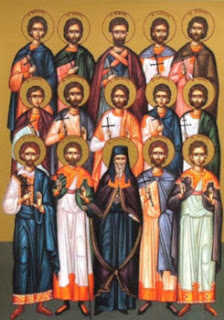
April 10 - The Holy Martyrs Terence and Companions.
The Holy Martyr Terence and his companions suffered under the emperor Decius (249-251). The emperor issued an edict, which commanded all subjects to offer sacrifice to the pagan idols.
When the governor of Africa Fortunatian received this edict, he gathered the people into the city square, set out cruel instruments of torture and declared that everyone without exception had to offer the sacrifice to the idols. Many, afraid of torture, complied, but forty Christians with Saint Terence at their head bravely stood forth for their faith in the Saviour. Fortunatian was amazed at their boldness and he asked how they, as rational people, could confess as God One Who was crucified by the Jews as a malefactor. In answer to this, Saint Terence boldly answered that their belief was in the Saviour Who voluntarily endured death on the Cross and on the third day was resurrected. Fortunatian perceived that Terence by his example inspired the others, and so he gave orders to isolate him in prison together with his three closest companions - Africanus, Maximus, and Pompey. The remainder of the martyrs - which included Xenon, Alexander, and Theodore, Fortunatian resolved to force into renouncing Christ. But neither threats nor terrible tortures could sway the holy martyrs: they burned at them with red hot iron, they poured vinegar on the wounds, they sprinkled on salt, they tore at them with iron claws. In spite of their sufferings, the saints did not weaken in their confession of Christ, and the Lord gave them strength.
Forunatian gave orders to lead the martyrs into the pagan temple and still yet another time he urged them to offer sacrifice to the idols. The valiant warriors of Christ cried out to God: "O God All-Powerful, having once poured out fire on Sodom for its iniquity, destroy now this impious temple of idolatry, on account of Thine Truth." The idols fell down with a crash and a smash, and then all the temple was in ruins. The enraged governor gave orders to execute them; and the martyrs, glorifying God, put their necks beneath the sword of the executioner.
After the execution of the 36 martyrs, Fortunatian summoned before him Terence, Maximus, Africanus, and Pompeys, pointed out to them the executed and again urged them to offer sacrifice to the idols. The martyrs refused. The governor put heavy chains on them and gave orders to starve them to death in prison. By night an Angel of the Lord took the chains off the martyrs and fed them. In the morning the guards found the saints cheerful and strong. Then Fortunatian ordered sorcerers and conjurers to carry into the prison snakes and all kinds of viprous creatures. The guards through an opening in the prison ceiling glanced down into the jail cell and saw the martyrs unharmed, praying, and the snakes crawling at their feet. When the snake-charmers in obeying the order opened the door of the prison-cell, the snakes disregarded the charms and struck and began to bite them. The furious Fortunatian gave orders to behead the holy martyrs. Christians took up their holy bodies and buried them with reverence outside the city.
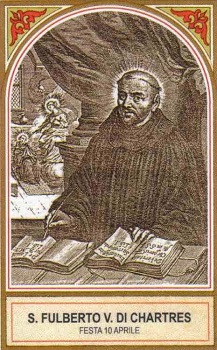
April 10 - Saint Fulbert, Bishop of Chartres.
We learn from Saint Fulbert of Chartres himself that he was of humble extraction, but we know little of his early years beyond the fact that he was born in Italy and spent his boyhood there. He was later on a student in Rheims and must have been one of its most distinguished scholars, for when the celebrated Gerbert, who taught him mathematics and philosophy, was raised to the papacy under the title of Silvester II, he summoned Fulbert to his side. When another pope succeeded, Fulbert returned to France, where Bishop Odo of Chartres bestowed upon him a canonry and appointed him chancellor. Moreover, the cathedral schools of Chartres were placed under his care, and he soon made them the greatest educational centre in France, attracting pupils from Germany, Italy and England. Regarded as a paragon of learning and described as a reincarnation of Socrates and Plato, he stood as a bulwark against the rationalizing tendencies of his day, although one at least of his pupils, the notorious Berengarius, afterwards lapsed into heresy. Upon the death of Bishop Roger, Fulbert was chosen to succeed him in the see of Chartres. In his humility the prelate elect wrote to Abbot Saint Odilo of Cluny that he trembled at the prospect of leading others in the way of holiness when he stumbled so repeatedly himself, but he was obliged to accept the office.Fulbert's influence was now immense, for besides retaining direction of the school he became the recognized counsellor of the spiritual and temporal leaders of France. Yet he never ceased to deplore his unfitness for the position he held, and was wont to describe himself as "the very little bishop of a very great church." External affairs were never allowed to interfere with the duty he owed to his diocese: he preached regularly from his cathedral pulpit and exerted himself to spread instruction in the territories under his jurisdiction. When, soon after his elevation, the cathedral of Chartres was burnt down, he at once set about rebuilding it with great magnificence, though this is not the cathedral which is now one of the glories of Christendom; people of all classes came to his assistance, including Canute, King of England, who contributed a large sum. Saint Fulbert had a great devotion to our Lady, in whose honour he composed several hymns, and when the beautiful new cathedral was opened he caused the recently introduced feast of her nativity to be celebrated there with great solemnity, as well as to be observed throughout the diocese.
Like most of the more eminent churchmen of his century he was an outspoken opponent of simony and of bestowing ecclesiastical endowments upon laymen. After an episcopate of nearly twenty-two years, he died on April 10, 1029. The writings of Saint Fulbert include a number of letters, a brief penitential, nine sermons, a collection of passages from the Bible dealing with the Trinity, the Incarnation and the Eucharist, and also some hymns and proses.


Books to feed your faith!
The Secret of Sanctity According to Saint Francis de Sales and Father Crasset SJ
$16.95
"I believe," says Father de Causade, "that if souls seriously aspiring to perfection understood this. and knew how direct is their path, they would be spared much difficulty. I say the same of souls living in the world, and of souls consecrated to God. If the first knew the means of merit afforded them by their ever-recurring daily duties and the ordinary actions of their state of life; if the second could persuade themselves that the foundation of sanctity lies in those very things which they consider unimportant and even foreign to them; if both could understand that the crosses sent by Providence which they constantly find in their state of life lead them to the highest perfection by a surer and shorter path than do extraordinary states or extraordinary works; and that the true philosopher's stone is submission to the order of God, which changes into pure gold all their occupations, all their weariness, all their sufferings,how happy they would be! What consolation and what courage they would gather from this thought, that to acquire the friendship of God and all the glory of heaven they have but to do what they are doing, suffer what they are suffering, and that what they lose and count as naught would suffice to obtain for them eminent sanctity! "O my God, that I might be the missionary of Thy holy will, and teach the whole world that there is nothing so easy, so simple, so within the reach of all, as sanctity! Would that I could make them understand that just as the good and bad thief had the same to do and suffer to obtain their salvation, so two souls, one worldly and the other wholly interior and spiritual, have nothing more to do one than the other: that he who sanctifies himself acquires eternal happiness by doing in submission to the will of God what he who is lost does through caprice; and that the latter is lost by suffering unwillingly and impatiently what he who is saved endures with resignation. The difference, therefore, is only in the heart. O dear souls who read this, let me repeat to you: Sanctity will cost you no more; do what you are doing; suffer what you are suffering: it is only your heart that need be changed. By the heart we mean the will. This change, then, consists in willing what comes to us by the order of God. Yes, holiness of heart is a simple fiat, a simple disposition of conformity to the will of God. And what is easier? For who could not love so adorable and merciful a will? Let us love it, then, and through this love alone all within us will become divine." (" Abandonment to Divine Providence.") But what will enable us to realize this ideal of a Christian and holy life? Prayer, or rather a spirit of confidence and faith which must pervade all our relations with God. I mean by this that disposition of the soul in which it recognizes that God loves it, that He cares for it, and that He desires in all things only the greater good of His little creature. He who possesses the secret of this blessed science has the secret of a good life, of true strength, and of perfect happiness. "He lives well who prays well," says St. Augustine.
The Liturgical Year: Lent (Volume 7)
$16.95
This is a fifteen volume set, which is being brought back into print for the edification of the Faithful. Anyone who wishes to appreciate the timeless Tridentine Mass and liturgy will find this set a valuable aid in that endeavor. Dom Gueranger has produced a most excellent work, which began the liturgical movement. We pray that this set of books will bring many more to a true appreciation of the Latin Mass and the Divine Office of the Catholic Church. At one time, under the impulse of that Spirit, which animated the admirable Psalmist and the Prophets, she takes the subject of her canticles from the Books of the Old Testament; at another, showing herself to be the daughter and sister of the holy Apostles, she intones the canticles written in the Books of the New Covenant; and finally, remembering that she, too, has had given to her the trumpet and harp, she at times gives way to the Spirit which animates her, and sings her own new canticle. From these three sources comes the divine element which we call the Liturgy. The Prayer of the Church is, therefore, the most pleasing to the ear and heart of God, and therefore the most efficacious of all prayers. Happy, then, is he who prays with the Church, and unites his own petitions with those of this Spouse, who is so dear to her Lord, that he gives her all she asks. It was for this reason that our Blessed Saviour taught us to say our Father, and not my Father; give us, forgive us, deliver us, and not give me, forgive me, deliver me. Hence, we find that, for upwards of a thousand years, the Church, who prays in her temples seven times in the day, and once again during the night, did not pray alone. The people kept her company, and fed themselves with delight on the manna which is hidden under the words and mysteries of the divine Liturgy. Thus initiated into the sacred Cycle of the mysteries of the Christian year, the faithful, attentive to the teachings of the Spirit, came to know the secrets of eternal life ; and, without any further preparation, a Christian was not unfrequently chosen by the Bishops to be a Priest, or even a Bishop, that he might go and pour out on the people the treasures of wisdom and love, which he had drunk in at the very fountain-head. For whilst Prayer said in union with the Church is the light of the understanding, it is the fire of divine love for the heart. The Christian soul neither needs nor wishes to avoid the company of the Church, when she would converse with God, and praise his greatness and his mercy. She knows that the company of the Spouse of Christ could not be a distraction to her. Is not the soul herself a part of this Church, which is the Spouse? Has not Jesus Christ said: Father, may they be one, as we also are one? and, when many are gathered in his name, does not this same Saviour assure us that he is in the midst of them? The soul, therefore, may converse freely with her God, who tells her that he is so near her; she may sing praise, as David did, in the sight of the Angels, whose eternal prayer blends with the prayer which the Church utters in time.
Charity: A Commentary on I Corinthians 13 by Saint Alphonsus
$9.99 paperback / $0.99 Kindle
Charity is patient, is kind: charity envieth not, dealeth not perversely; is not puffed up; Is not ambitious, seeketh not her own, is not provoked to anger, thinketh no evil; Rejoiceth not in iniquity, but rejoiceth with the truth; Beareth all things, believeth all things, hopeth all things, endureth all things. (I Corinthians 13:4-7) Saint Paul wrote wonderfully about charity in the 13th chapter of First Corinthians. Saint Alphonsus takes these words and gives a simple view of the Catholic way of life and an excellent introduction into the spiritual life. This is excerpted from his work, The Holy Eucharist, which has been excerpted from The Complete Works of Saint Alphonsus, which was compiled and translated by Father Eugene Grimm. (1835-1891)
For More Good Traditional Catholic Books:


Roast Leg of Lamb
A delicious and traditional Easter dish, simple but delightful.
Prep: 15 minutes
Cook: 1 h 45 minutes
Ready In: 2 hours 10 minutes
"Cooking peeled potatoes in the pan around the roast makes a delicious side. The only other things you need are gravy made from the pan drippings and a fresh vegetable."
Ingredients
4 cloves garlic, sliced
2 tablespoons fresh rosemary
salt to taste
ground black pepper to taste
5 pounds leg of lamb
Directions
Preheat oven to 350 degrees F (175 degrees C).
Cut slits in the top of the leg of lamb every 3 to 4 inches, deep enough to push slices of garlic down into the meat. Salt and pepper generously all over the top of lamb, place several sprigs of fresh rosemary under and on top of the lamb. Place lamb on roasting pan.
Roast in preheated oven until the lamb is cooked to your desired doneness, about 1 3/4 to 2 hours. Do not overcook the lamb, the flavor is best if meat is still slightly pink. Let rest at least 10 minutes before carving.
Kulich (Russian Panettone)

Prep: 30 minutes
Cook: 1 hour
Ready In: 6 hours 10 minutes
Kulich is a sweet yeast bread, similar to panettone, that is traditionally baked in Russia for Easter. But you can enjoy it any time! It can be glazed or left plain. You can bake the bread in large coffee tins so they keep their traditional shape.
Ingredients
Kulich:
1/2 cup sultana raisins or golden raisins
1/4 cup rum or vodka
3 (.25 ounce) packages active dry yeast
1 cup white sugar, divided
1 1/2 cups warm milk (105 degrees F (40 degrees C))
6 cups sifted all-purpose flour, divided
5 eggs, separated
1 pinch salt
1 teaspoon vanilla extract
1 cup unsalted butter, softened
2 tablespoons unsalted butter, softened
1/2 cup chopped almonds
1/2 cup candied mixed fruit peel
Icing:
2 cups confectioners' sugar
1 egg white
1 teaspoon lemon juice
Directions
Combine sultanas/raisins and rum/vodka in a small bowl and let soak.
Dissolve yeast and 1/2 teaspoon sugar in 1/2 cup milk in a bowl. Let stand until yeast softens and begins to form a creamy foam, about 10 minutes.
Mix remaining 1 cup milk and 1 cup flour together in a bowl. Add yeast mixture and stir well. Cover and let stand in a warm place for 30 minutes.
Beat 5 egg whites and salt in a glass, metal, or ceramic bowl until stiff peaks form.
Combine remaining sugar and egg yolks in a large bowl; beat with an electric mixer until fluffy and pale, about 5 minutes. Beat in vanilla extract. Drain sultanas/raisins and add rum/vodka to egg mixture. Add to yeast mixture and mix well. Fold in egg whites gently. Add remaining flour in small batches, mixing well after each addition, until dough starts to pull away from the sides of the bowl.
Turn out dough onto a floured work surface and knead for about 10 minutes, adding more flour as needed. Start rubbing in 1 cup plus 2 tablespoons butter, 1/4 cup at a time, once dough seems pliable and soft. Knead for 2 more minutes and form into a ball.
Transfer to a clean, lightly oiled bowl. Cover with plastic wrap and a clean dish towel. Allow to rise in a warm place until doubled in volume, about 90 minutes.
Tun dough out onto a floured work surface and knead for 2 minutes. Sprinkle flour over sultanas/raisins. Scatter sultanas/raisins, almonds, and mixed peel in a circle around the dough. Keep kneading dough to incorporate fruits and nuts evenly.
Line 2 large metal coffee tins with parchment paper. Divide dough in half and transfer to the tins. Cover with a clean dish towel. Allow to rise in a warm place until dough has risen to the top, 30 minutes to 1 hour.
Preheat oven to 350 degrees F (175 degrees C).
Bake kulich in the preheated oven until top is golden brown and a toothpick inserted in the middle comes out clean, about 1 hour. Carefully tip loaves out of the tins onto a work surface and let cool, about 2 hours.
Combine confectioners' sugar, 1 egg white, and lemon juice in a small bowl. Brush over the the tops of the kulich loaves, allowing icing to run down the sides.

Video sermons and instructions: Timeless timely truths for living the Faith
Easter Sunday 2011
Easter 2013
One Flock
Third Sunday after Easter 2013

Encouragement for Today
Therefore encourage one another and build one another up.... I Thessalonians 5:11
We believe...
that through our assorted podcasts, audio downloads and devotional blogs, you will find an assorted Treasure Chest of...
Sermons
Devotionals
Scripture Studies
Catechism Lessons
Daily Blogs
...that will be a help in your faithful walk with the Lord.
LEARN MORE AT THE ENCOURAGEMENT FOR TODAY WEBSITE: https://www.encouragementfortoday.com
Frogs of Madagascar

“And God said: Let the earth bring forth the living creature in its kind, cattle and creeping things, and beasts of the earth, according to their kinds. And it was so done.”
Genesis 1:24.
Madagascar is replete with many species of wildlife. Not the least of these are the many wonderful species of frog. About 350 species of frog live on the island, and one science website recently reported on five new species being discovered. The largest would fit comfortably on your thumbnail, while the smallest is the size of a grain of rice! The article suggests that the extreme miniaturization is a trait that had to evolve, and they suggest that it must have evolved separately on five different occasions, in five different regions.
What is especially fascinating about these little frogs is that they are vertebrates. So, even though they are much smaller than many insects, they have tiny little bones. Many people are particularly attracted to frogs, more than other animals, because their faces and feet resemble human faces and hands.
For several years, a research group under the auspices of Answers in Genesis has been estimating how many animals might have been aboard Noah’s Ark. It turns out to be a lot less than one might have expected. When it comes to the anura (the order containing frogs and toads), they have estimated there may have been 138 kinds. It appears that all those in Madagascar are of the same kind or baramin (mantellidae), so it is likely that miniaturization did indeed develop in Madagascar – but this would be by selection from genetic information already created by God, not by the random appearance of new information.

Catechism Catch-Up
The Third Commandment Lesson 5
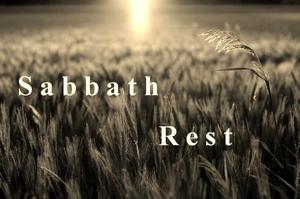
Remember that thou keep holy the sabbath day. Six days shalt thou labour, and do all thy works; but on the seventh day is the sabbath of the lord thy god; thou shalt do no work on it, neither thou nor thy son, nor thy daughter, nor thy man-servant, nor thy maid-servant, nor thy beast, nor the stranger that is within thy gates. For in six days the lord made heaven and earth, and the sea, and all things that are in them, and rested on the seventh day; wherefore the lord blessed the seventh day and sanctified it. (Exodus 20:8-11)
The Reasons for This Commandment
We were created for work, but we were also made to rest. It’s interesting that even secular studies have embraced the idea that we need to take a break and relax regularly.
Physical Transformation:
1. Time out reduces stress.
The National Institute for Occupational Safety and Health (NIOSH) reports in a CDC publication that stress levels at work at higher than ever and that "health care expenditures are nearly 50% greater for workers who report high levels of stress." Stress creates havoc with our physical and emotional health. "A growing body of evidence shows that "...skipping breaks can lead to stress and exhaustion."
2. Time out gives you a chance to move.
We've all seen the studies on the impact of a lot of sitting time on many aspects of health: "Research has linked sitting for long periods of time with a number of health concerns, including obesity and metabolic syndrome -- a cluster of conditions that includes increased blood pressure, high blood sugar, excess body fat around the waist and abnormal cholesterol levels. Too much sitting also seems to increase the risk of death from cardiovascular disease and cancer." Sitting extends beyond TV time to include all time at a screen, time at work, in the car, visiting with friends...in short, the kinds of things that fill the day for most of us.
3. Completely divesting from your work on a regular basis reduces inflammation and the risk of heart disease.
Most occupations these days are sedentary. Modifiable risk factors for heart disease and general inflammation are uncontrolled diabetes, physical inactivity, overweight or obesity and uncontrolled stress or anger. We already know that work is stressful. In addition, studies show that time sitting, as most of us do at work, influences inflammatory markers even absent elevated blood glucose, obesity or heart disease. Each one hour increase in sitting time associates with an 18% increased cardiovascular disease mortality risk.
4. Getting away from work boosts your immune system.
Chronic stress also depresses your immune system. Conversely adequate sleep and exercise are two of four essentials of boosting your immune system. Take advantage of your weekends for extended R&R.
5. Speaking of sleep, you'll do it better during time out of work.
Time off helps sleep-disrupting habits like checking your cell phone before bed.
6. Your active time off adds years to your life.
Results of studies suggest that a higher amount of daily total sitting time associates with all-cause mortality, particularly among inactive adults.
Mental and Emotional Transformation:
7. Taking regular time away from work restores mental energy.
You probably know that just from your own experience. Science supports your intuition! Studies show "that people who do not know how to detach from work during their off time experience increased exhaustion over the course of one year and are less resilient in the face of stressful work conditions."
8. When you take out time for yourself, you're more creative.
Are you the creative type? You need time out! "Thinking is one of the crucial benefits of stepping back. Just as quality time off fuels energetic resources on the job, reflective time is critical to producing solutions and creative breakthroughs."
9. You're also more productive when you take time out from work.
Data from the OECD shows that working more hours means less productivity. The most productive countries are Germany and France--each mandating more than 30 days of vacation. Workers in the U.S., with no law requiring paid time off, are the third most productive (and only about 25% of Americans take their full allotment of vacation time).
10.You'll focus better at work if you take your weekly rejuvenation time.
A 2008 University of Illinois study shows that all work and no play dramatically reduces focus as well as productivity. Conversely, regular time off work improves it. Be sure you opt for "restorative" breaks.
11. Your day off improve short-term memory.
Do you laugh knowingly at all those jokes about seniors forgetting what they were going to do or where they put their keys? Did you think it was just a sign of aging? Could be that you're just not managing your time out during the week properly. Separate from work, enjoy life, and as many studies show, you will probably remember where those keys are.
12. With regular time away from work, you might even love your job again!
Consultants all tell us that "Finding time to chill and unwind will help you enjoy both work and play more." In a recent Harvard Business Review article, the first recommendation for restoring passion about work is to "call a timeout." It works, according to many testimonies.
A Day of Rest: Scientific Reasons Why it Works.
Rest is a creational principle—it is embedded in the molecules of our DNA.
God gave us permission to take a break once a week by modeling rest for himself.
(Genesis 2:2-3)
And on the seventh day God ended his work which he had made: and he rested on the seventh day from all his work which he had done.
And he blessed the seventh day, and sanctified it: because in it he had rested from all his work which God created and made.
(Exodus 20:8-10)
Six days shalt thou labour, and do all thy works; but on the seventh day is the sabbath of the lord thy God; thou shalt do no work on it.
Take advantage of this special day!
At first, it appears that Jesus was the ultimate Sabbath breaker. The Jewish religious leaders were furious with him for continually healing people on Saturday, which was known to the Jewish people as the “Sabbath” (a sacred or holy day). But if we look closer at the passages where Jesus performed acts of healing on the Sabbath, we’ll notice that, far from being a Sabbath breaker, Jesus was a Sabbath keeper.
The religious leaders in Jesus’ day misunderstood the true purpose of the Sabbath, so they distorted it and added new rules on how to keep it. Jesus exposed the truth: if a man can be circumcised on the Sabbath in order to keep the law of Moses, certainly the healing of a man is acceptable according to the same law.
(John 7:22–23)
Therefore, Moses gave you circumcision (not because it is of Moses, but of the fathers;) and on the sabbath day you circumcise a man.
If a man receive circumcision on the sabbath day, that the law of Moses may not be broken; are you angry at me because I have healed the whole man on the sabbath day?
There is one significant difference between the Jewish Sabbath and the Christian Sabbath (or Lord’s Day) that is important to note. The Jewish Sabbath mirrors the creation account in Genesis 1–2, where God worked for six days and rested on the seventh. Interestingly though, the Lord’s Day reverses this pattern entirely.
According to the Law, we are to work first, and then we are granted rest. Jesus reversed this pattern for us when he perfectly obeyed all of the Ten Commandments and kept the law on our behalf.
(Matthew 5:17-18)
Do not think that I am come to destroy the law, or the prophets. I am not come to destroy, but to fulfill.
For amen I say unto you, till heaven and earth pass, one jot, or one tittle shall not pass of the law, till all be fulfilled.
By living the perfect life, Jesus has met God’s perfect standard.
According to the book of Hebrews, Jesus provided rest for us (4:8) and then out of that rest and the gratitude we have toward Him, we actually want to work.
Because of Jesus’ work, we start each week with rest—mirroring that eternal Sabbath rest that is already our inheritance in the new creation.
(Hebrews. 4:9–10)
There remaineth therefore a rest to the people of God.
For he that is entered into his rest, he also hath ceased from his own works, as God did from his.
Giving thanks to God, we return to our workweek refreshed and thankful for what God has done for us in Christ.
In our next lesson we will show why we as Catholics have Sunday as our Sabbath.
Living Catholic:
VIEWING FORGIVENESS FROM THE PERSPECTIVE OF GOD AND MAN
-
OUR PERSPECTIVE WHEN OFFENDED
Then came Peter unto him and said: Lord, how often shall my brother offend against me, and I forgive him? till seven times? Matthew 18:21
Notice that the focus of St. Peter's mind was retaliation. It was only a question of how long he had to wait before gaining revenge.
-
GOD'S BIGGER PERSPECTIVE
Jesus saith to him: I say not to thee, till seven times; but till seventy times seven times.
Therefore is the kingdom of heaven likened to a king, who would take an account of his servants. And when he had begun to take the account, one was brought to him, that owed him ten thousand talents. And as he had not wherewith to pay it, his lord commanded that he should be sold, and his wife and children and all that he had, and payment to be made.
A man so hopelessly in debt would have no ability to pay this debt just as we have no ability to repay God for what it cost Him to redeem us with the blood of Jesus Christ.
But that servant falling down, besought him, saying: Have patience with me, and I will pay thee all. And the lord of that servant being moved with pity, let him go and forgave him the debt.
This man is not yet willing to admit that he can't pay back what he owes.
But when that servant was gone out, he found one of his fellow servants that owed him an hundred pence: and laying hold of him, throttled him, saying: Pay what thou owest.
And his fellow servant falling down, besought him, saying: Have patience with me, and I will pay thee all.
And he would not: but went and cast him into prison, till he paid the debt.
It is quite possible that this fellow was motivated by the desire to get a reserve of money so he would never again have to bear the humility of poverty. Yet this is the quality of heart God wants each of us to have throughout life. "Blessed are the poor in spirit. .." (Matthew 5:3)
Now his fellow servants seeing what was done, were very much grieved, and they came and told their lord all that was done.
Then his lord called him; and said to him: Thou wicked servant, I forgave thee all the debt, because thou besoughtest me:
Shouldst not thou then have had compassion also on thy fellow servant, even as I had compassion on thee?
And his lord being angry, delivered him to the torturers until he paid all the debt. So also shall my heavenly Father do to you, if you forgive not every one his brother from your hearts. Matthew 18:22-35
-
And so lastly we read from Ephesians 4:32, That we must “forgive one another, even as God hath forgiven you in Christ.
To Learn More Principles For Life Go To: Resources: Principles of Life

Pray for the Holy Father! Pray with the Holy Father!
-
Your prayers are asked this month and every month for the intentions of the Holy Father, Pope Michael
- Pray especially that Holy Ghost inspires and helps us prepare spiritual manuals and days of recollection to make available to all.
-
Keep in your prayers our Podcast Ministry, a new way to reach out in the missionary work of the Church! We ask for prayers for our other activities world wide. We have made good contacts in the Philippines and Japan and ask prayers that these contacts will bear much fruit for the salvation of souls.
-
Be sure to keep St. Helen Catholic Mission in your prayers. Why not go on over to the site now and see what they have to offer and how you might be able to help!
-
Also we ask you to keep in prayer our increasing missionary work in the United States and elsewhere.
-
Your prayers are asked for Father Francis Dominic as he begins a new work in Kissimmee Florida that has been entrusted to him within the Church.
-
Pray for those outside the Church and those who do not know God, that they may see the light of grace and be led safely home to the refuge of the Holy Catholic Church.
-
As always, we also ask that you pray for yourself! Never forget your own state of soul. God is calling you to His service in His love. We know that our Lord can count on you to answer.
-
We are all praying especially for you, too. May you correspond with every grace of God!
-
In what other needs or intentions may we pray for you? Let us know!
-
Let us remember that the Church runs on prayer. Without your prayers, God will not work in hearts and souls to bring them to a knowledge of the truth. (I Timothy 2:4)



To Donate by Mail:
Our address is
Vatican in Exile
829 NE Chester
Topeka, Kansas 66616
Make Checks payable to:
Vatican in Exile

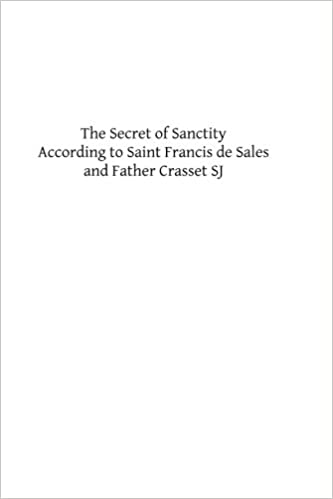
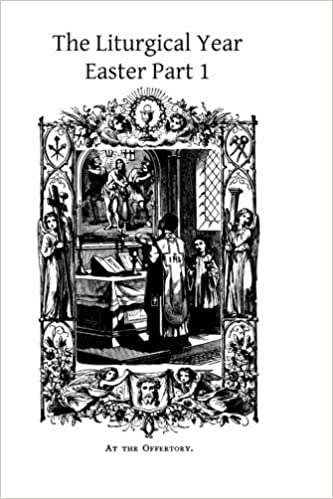
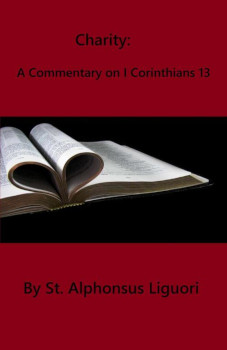
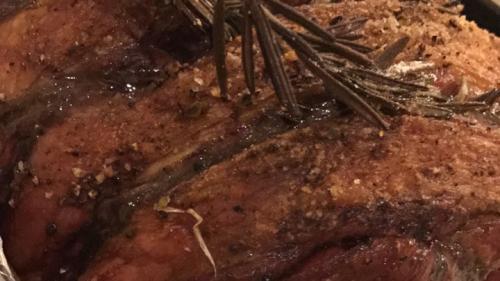









 Follow
Follow


